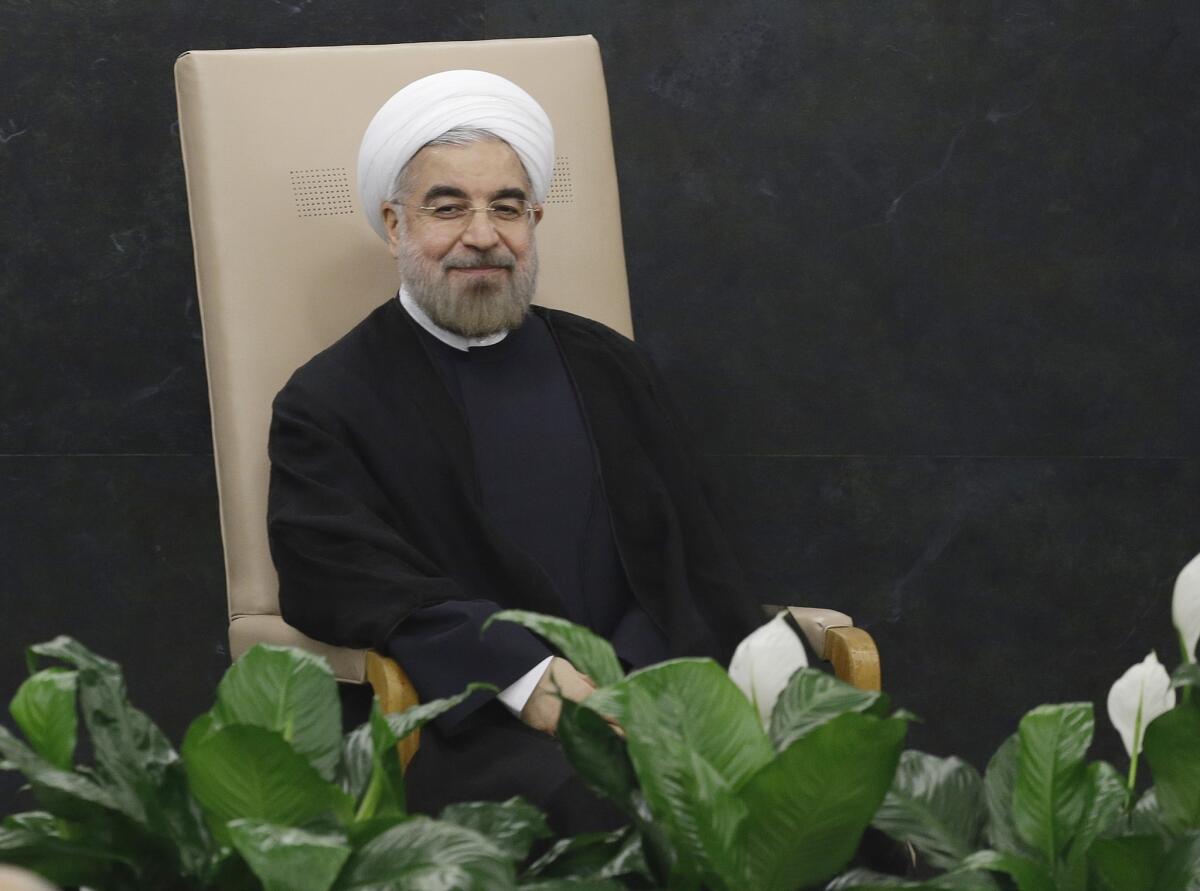The case for a deal with Iran

- Share via
It’s understandable that there is skepticism about whether Iran would abide by an interim agreement to suspend most of its nuclear activities in exchange for some relief from economic sanctions. But the United States and the other nations that have been negotiating with the new government in Tehran are right to pursue such an arrangement as a way to test Iran’s insistence that it’s willing to forswear the development of nuclear weapons over the long run. Members of Congress inclined to oppose this initiative should allow it time to succeed or fail.
Expectations about a deal were heightened Friday when Secretary of State John F. Kerry flew to Geneva, where Iran has been negotiating with the so-called P5-plus-1 — the five permanent members of the United Nations Security Council and Germany. But on Saturday night, this round of talks adjourned without an agreement.
U.S. officials have suggested that an interim deal would bar Iran from “advancing” its nuclear program during a transitional period, in exchange for the release of some Iranian assets frozen in overseas banks. Meanwhile, negotiators would continue to pursue a final agreement to resolve all remaining concerns about the development of an Iranian nuclear arsenal.
Critics have pounced on reports that a proposed interim deal might not require Iran to suspend all enrichment of uranium, as U.N. resolutions dating back to 2006 have demanded. Without such a commitment, they argue, even a minor relaxation of sanctions would allow Iran to string the international community along while it continued to make progress toward a nuclear weapon.
Israeli Prime Minister Benjamin Netanyahu, who repeatedly has warned that a nuclear-armed Iran would threaten his country, said, “The deal that is being discussed in Geneva right now is a bad deal.” On Capitol Hill, legislation is being prepared that would prevent President Obama from relaxing sanctions against Iran in the absence of concessions far greater than are likely to be included in an interim agreement.
These objections are rooted in historical reality. In the past, Iran has evaded international accountability in a way that cast doubt on its protestations that its nuclear program was for peaceful purposes only. But in June, Iranians elected as their president Hassan Rouhani, who has called for creative negotiations to resolve the nuclear issue and who seems to have the support of Supreme Leader Ayatollah Ali Khamenei and the country’s religious establishment.
Obviously Rouhani’s assurances shouldn’t be taken at face value. But if, in the next round of talks, Iran agrees to restraints that effectively stop the clock on weaponization, the international community should be willing to reciprocate with a measured — and reversible — relaxation of sanctions. Ideally that gesture would make it easier for Rouhani to engage in negotiations on a more comprehensive agreement, one that would allow Iran to use nuclear power for civilian purposes while forestalling a regional nuclear arms race.
Yes, there are risks in an interim agreement. Iran might renege on its assurances or drag out negotiations. Even if Rouhani is sincere, the country’s religious leaders might balk at allowing him to conclude an agreement. But these uncertainties must be weighed against the indications that Iran is willing to abandon its nuclear ambitions in exchange for an end to economic isolation. It would be irresponsible for the U.S. and its partners not to pursue that possibility.
More to Read
A cure for the common opinion
Get thought-provoking perspectives with our weekly newsletter.
You may occasionally receive promotional content from the Los Angeles Times.






